March Feature
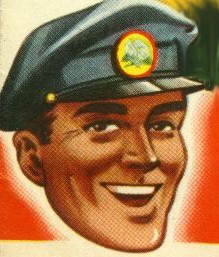 Caps,
Badges &patches
Caps,
Badges &patches
I'm not sure where the tradition
of service station attendents wearing caps started , but it did--and created
another area of collectables for us to find . They are not a easy
item to find. Unlike oil cans or road maps , most garages
would have only a few caps arround at a time , And like a pair of shoes
no one wants to replace them once they are finally "broken - in . Thus
caps would be dirty and well worn before a new one was ordered. Even then
why would the attendent bother to save a soiled , sweaty and tatored cap.
Just remove the hat badge and toss the rest in the garbage.
Service
station caps were produced by several uniform suppliers in different styles,
but I will concentrate on the ones issued to station and warehouse employees
of Canadian Oil Companies Limited.
Caps were usually a two piece
item : the band, and the bill (together referred to as "frames') and the
fabric top ("covers") . Optional winter
covers enclosed the vented head band.
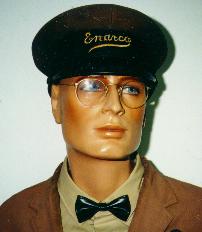 The earliest photo I can find of an employee of
Canadian Oil Companies Ltd. wearing an
attendants cap shows the above style. The year
was 1934 but they may have been in use before that. My photos lead me to
believe uniforms were probably worn mainly in the cities and larger
towns while dress codes were quite casual in the rural areas , especially
when you see realize these
were depression years.
This example has a black frame with a tan cover,
while a friends version has a (once) white
cover. Both have a rectangular black patch with
the En-ar-co script embroidered in gold.
I also have 1937 photos from a warehousemans contest,
where the winner would be awarded a
new "hat". It appears it was the employees
responsibility to purchase their own caps.
These caps were round, in comparison to the later
8 point covers. They also had a braided
cord, just above the 'visor', probably for decoration
but attendents soon found it a handy spot
to hold a pencil.
The earliest photo I can find of an employee of
Canadian Oil Companies Ltd. wearing an
attendants cap shows the above style. The year
was 1934 but they may have been in use before that. My photos lead me to
believe uniforms were probably worn mainly in the cities and larger
towns while dress codes were quite casual in the rural areas , especially
when you see realize these
were depression years.
This example has a black frame with a tan cover,
while a friends version has a (once) white
cover. Both have a rectangular black patch with
the En-ar-co script embroidered in gold.
I also have 1937 photos from a warehousemans contest,
where the winner would be awarded a
new "hat". It appears it was the employees
responsibility to purchase their own caps.
These caps were round, in comparison to the later
8 point covers. They also had a braided
cord, just above the 'visor', probably for decoration
but attendents soon found it a handy spot
to hold a pencil.
Wartime brought about an increase of female "pump
jockeys" and a 1940 photo shows a
young girl in a sharp uniform and a peaked
(garrison ?) cap -- without a name patch.
The Spring 1942 White Rose News shows
the first cap "badge" I've seen. I do not have an
example of this version but it can be seen
in the illustration at the top of this page. It is round with a yellow
background and has a image of the white rose but no lettering.
New shirt and uniform patches were created, in
two sizes (3 1/2" and 4" dia.).These were
yellow and had "White Rose" lettering ,
horizontally under the image of a rose.
Leather bow ties, jodhpurs, and breeks completed
the "look".
I have a 1944 invoice from Santhill-Levine , a
Canadian uniform supplier, charging a
local station for the following:
Trousers $6.00 / pair
Shirts $1.75
Cap
$1.75
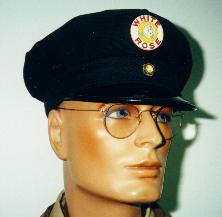 1947 shows the first 'encircled rose' cap badge
I can find. It is a pinback badge with
1947 shows the first 'encircled rose' cap badge
I can find. It is a pinback badge with
the words "White Rose" circling the flower.
Caps are now the 8-point style
, and the frames had a wicker head band for ventilation.
The cap in the photo above has the optional 'winter
band' installed, a snap-on strip of fabric which covers the wicker
frame to keep your head warmer.
The photo above also shows a safe driving
pin,an award comemmorating the 'tankwagon'
drivers number of years without an accident.
The safe driving program originated in
1945 but pins were not awarded until 1950.
Bronze pins were issued for the first four years,
while five years accident free were recognized
with a silver pin and a wrist watch. Ten years and
up got you a gold pin. All had the image
of a white rose and the number of years represented.

In 1951 the company began issuing the first 'encircled
rose' uniform patch and the option of a baseball style cap with fold down
ear-flaps. (see a later version---below)
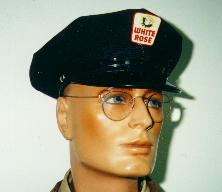 In 1953 the "New" wedge logo was introduced and
a new flat, metal pin-back badge .
Cloth "wedge" style uniform patches appeared at
this time.
In 1953 the "New" wedge logo was introduced and
a new flat, metal pin-back badge .
Cloth "wedge" style uniform patches appeared at
this time.
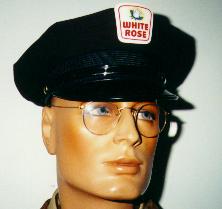 In 1955 the metal badge was replaced by the plastic
, wedge shaped badge.
In 1955 the metal badge was replaced by the plastic
, wedge shaped badge.
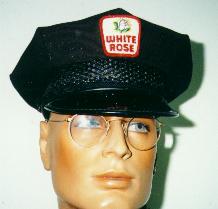 In 1959 a sewn-on, embroidered crest replaced
hat badges. Uniforms now included a regular
neck-tie or bow tie, a large embroidered shirt
patch, a small ''wedge' logo patch above the jacket pocket, and a
shoulder patch with 'Canadian Oil' over a small wedge crest. Round style
caps were again available along with the 8-point style (shown above).
In 1959 a sewn-on, embroidered crest replaced
hat badges. Uniforms now included a regular
neck-tie or bow tie, a large embroidered shirt
patch, a small ''wedge' logo patch above the jacket pocket, and a
shoulder patch with 'Canadian Oil' over a small wedge crest. Round style
caps were again available along with the 8-point style (shown above).
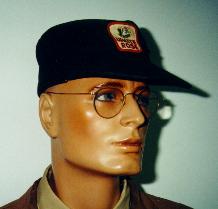 A baseball style cap with fold down ear-flaps.
These babies are warm !
A baseball style cap with fold down ear-flaps.
These babies are warm !
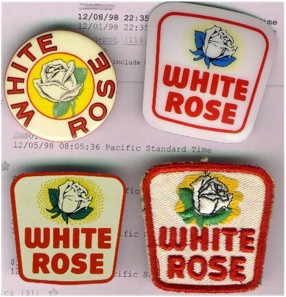
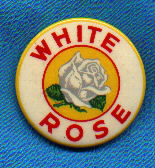
Please Sign my Guestbook----I want to hear from you!
Sign
My Guestbook View
My Guestbook
SEE YOU NEXT MONTH !
e-mail-- wpf@mnsi.net
| En-Ar-Co
/ White Rose |
| Daily
Enarcogram |
Brief
Company History
| The
White Rose Story
Boy
and Slate | Logos
| Time
Line | Old
Photos
Monthly
Feature | Past
Features | Gaspumps
| My '36 Ford
Dirty
Rusty Oily Stuff |
Oil Cans
| Other
Products
Gasolines
and Globes | Daily
Enarcogam |
Petroliana
Links | Credits
| Buy/Sell/Trade
| About Me
National
Refining Company |
Primary Petroliana










